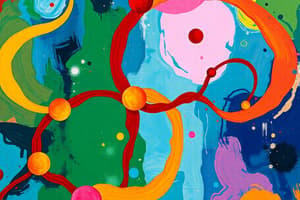Podcast
Questions and Answers
What is metabolism?
What is metabolism?
The sum total of all the reactions in a body.
What is bioluminescence?
What is bioluminescence?
- The ability to produce light in the dark (correct)
- The ability to move in water
- The ability to produce sound
- The ability to produce heat
What are the two types of metabolism?
What are the two types of metabolism?
Catabolism and Anabolism.
What is an example of a catabolic pathway?
What is an example of a catabolic pathway?
What is bioenergetics?
What is bioenergetics?
In a redox reaction, what does oxidation refer to?
In a redox reaction, what does oxidation refer to?
What is the definition of energy?
What is the definition of energy?
What is the role of ATP in metabolism?
What is the role of ATP in metabolism?
In reduction, a substance gains __________.
In reduction, a substance gains __________.
Match the following terms with their definitions:
Match the following terms with their definitions:
Flashcards are hidden until you start studying
Study Notes
Cell Metabolism
- Metabolism: The sum of all chemical reactions in an organism; crucial for energy production and cellular work.
- Bioluminescence: An example of energy conversion where organisms convert chemical energy into light.
- Living cells are miniature chemical factories with thousands of reactions.
- Metabolism is an emergent property arising from molecular interactions within a cell.
- Metabolic pathways: Series of enzyme-catalyzed reactions converting a starting molecule into a product.
Catabolic and Anabolic Pathways
- Catabolic pathways: Release energy by breaking down complex molecules into simpler ones (e.g., cellular respiration breaking down glucose to produce ATP).
- Anabolic pathways: Consume energy to build complex molecules from simpler ones (e.g., protein synthesis from amino acids).
- Bioenergetics: The study of how organisms manage their energy resources.
- Organisms utilize both organic (proteins, carbohydrates, fats, nucleic acids) and inorganic molecules.
Redox Reactions
- Redox reactions (oxidation-reduction): Transfer of electrons between molecules, releasing energy stored in organic molecules, ultimately used for ATP synthesis.
- Oxidation: Loss of electrons.
- Reduction: Gain of electrons.
- Reducing agent: Electron donor.
- Oxidizing agent: Electron acceptor.
- Some redox reactions involve changes in electron sharing in covalent bonds.
Energy and its Transformations
- Energy: Capacity to cause change; exists in various forms.
- Kinetic energy: Energy of motion.
- Heat (thermal energy): Kinetic energy from random atomic/molecular movement.
- Potential energy: Energy stored due to location or structure.
- Chemical energy: Potential energy released during chemical reactions.
- Energy can be converted between different forms (e.g., light energy in bioluminescence).
Laws of Energy Transformation (Thermodynamics)
- Thermodynamics: The study of energy transformations. (Note: The provided text cuts off before completing this section.)
Studying That Suits You
Use AI to generate personalized quizzes and flashcards to suit your learning preferences.




